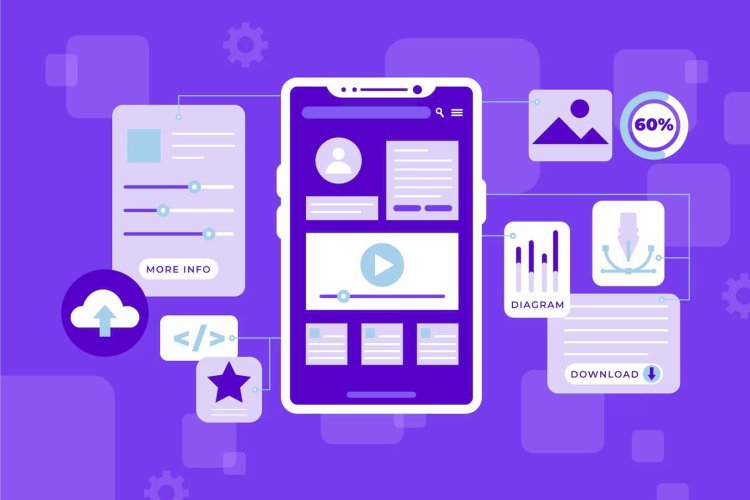How 5G is Revolutionizing Mobile App Development

The advent of 5G technology has ushered in a new era of mobile connectivity, drastically transforming how mobile applications are developed and used. With ultra-fast speeds, minimal latency, and enhanced connectivity, 5G is set to revolutionize mobile app development, enabling developers to create more immersive, responsive, and powerful applications. This article explores the profound impact of 5G on mobile app development and the future trends it is shaping.
1. Ultra-Fast Speed Enhancing User Experience
One of the most significant advantages of 5G is its lightning-fast speed, which can reach up to 10 Gbps—almost 100 times faster than 4G LTE. This rapid data transfer ensures that mobile applications load instantly, reducing buffering time and lag. Streaming apps, gaming apps, and data-heavy applications benefit the most, offering a seamless user experience with ultra-HD content and real-time responsiveness.
2. Low Latency Enabling Real-Time Applications
Latency refers to the delay in data transmission. 5G reduces latency to as low as 1 millisecond, compared to 4G’s 50 milliseconds. This low latency is crucial for real-time applications such as:
- Augmented Reality (AR) and Virtual Reality (VR): Enhanced AR/VR experiences for gaming, education, and training.
- Remote Healthcare: Telemedicine apps can now support real-time video consultations and remote surgeries with high precision.
- IoT and Smart Cities: Applications connected to smart devices will function seamlessly, enabling real-time monitoring and automation.
3. Better Connectivity for IoT and Smart Applications
5G’s ability to connect millions of devices simultaneously makes it ideal for IoT-based applications. Smart homes, wearable technology, and connected vehicles will experience improved performance with uninterrupted, high-speed connectivity. Developers can now create advanced IoT applications that efficiently communicate with multiple devices without connectivity issues.
4. Enhanced Cloud Integration
Cloud computing plays a crucial role in mobile app development, and 5G strengthens this integration by providing:
- Faster Cloud Access: Users can access cloud-stored data and applications instantly.
- Reduced Device Dependency: Mobile apps can offload processing to the cloud, reducing the need for high-end hardware.
- Seamless Collaboration: Remote work applications, cloud gaming, and SaaS platforms will function more efficiently with improved connectivity.
5. High-Quality Streaming and Media Consumption
With 5G, streaming services such as Netflix, YouTube, and gaming platforms can deliver 4K and even 8K resolution videos without buffering. This also paves the way for:
- Live Streaming without Lag: Social media apps can provide smoother live streaming experiences.
- Cloud Gaming Revolution: Platforms like Google Stadia, NVIDIA GeForce Now, and Xbox Cloud Gaming will gain mass adoption as users experience console-quality games on mobile devices.
6. Improved Mobile App Security
The improved network capabilities of 5G also bring advancements in security, such as:
- Enhanced Encryption and Authentication: Mobile apps can utilize stronger encryption protocols to protect user data.
- Network Slicing for Better Security: Developers can leverage network slicing to create separate, secure connections for different applications, enhancing security and efficiency.
- Reduced Cyber Threats: With real-time monitoring and AI-driven security measures, mobile applications can mitigate security risks more effectively.
7. New Possibilities for AI and Machine Learning
AI-driven applications will significantly benefit from 5G, as the technology facilitates:
- Faster Data Processing: AI-based apps like virtual assistants and recommendation engines will work more efficiently.
- Advanced Personalization: AI-driven features such as voice recognition, chatbots, and facial recognition will become more responsive and accurate.
- Enhanced Automation: Industries such as e-commerce, healthcare, and finance will integrate AI for better automation and decision-making.
8. Revolutionizing Mobile Gaming
Mobile gaming is one of the most impacted sectors by 5G technology. Game developers can now:
- Create High-Fidelity Multiplayer Games: Cloud gaming platforms will offer real-time, immersive experiences.
- Reduce Lag and Latency Issues: Players will enjoy a seamless gaming experience with minimal lag.
- Enable AR and VR Gaming: The adoption of AR/VR gaming will increase with high-speed, low-latency connectivity.
9. Transforming E-Commerce and Mobile Payments
5G is enhancing the shopping experience through:
- Faster Mobile Payments: Transactions will be quicker, reducing checkout times.
- AR Shopping Experiences: Shoppers can virtually try products using AR before purchasing.
- Improved Customer Engagement: Businesses can provide personalized recommendations and real-time customer support.
10. Challenges and Considerations for 5G App Development
While 5G presents numerous opportunities, developers must address challenges such as:
- Network Availability: 5G infrastructure is still under development in many regions.
- Security Risks: Developers must implement strong security measures to prevent cyber threats.
- Increased Development Costs: Creating applications that fully leverage 5G may require additional investment in resources and technology.
Conclusion
5G is a game-changer for mobile app development, enabling ultra-fast speeds, low latency, enhanced security, and improved connectivity. It is set to transform industries, from gaming and healthcare to e-commerce and IoT applications. As 5G continues to expand globally, developers and businesses must embrace its potential to create innovative, high-performance applications that redefine user experiences.
What's Your Reaction?














